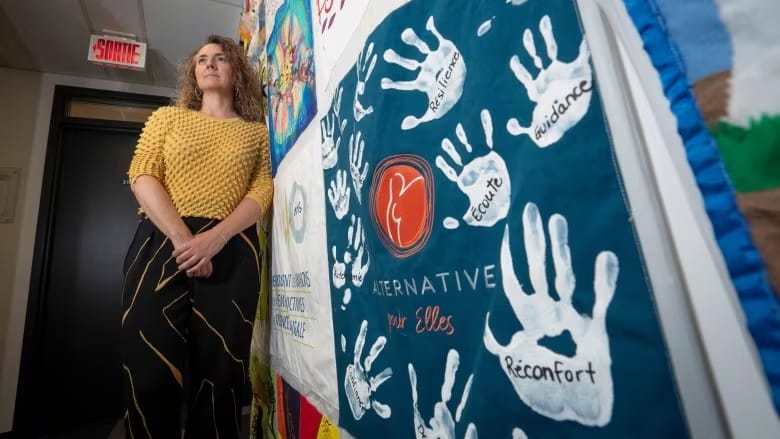Quebec pioneers training to recognize coercive control as intimate partner violence
Network for victims has trained over 6,000 interveners in the province

On an unusually hot spring day in Montreal, lawyer Karine Barrette was addressing an audience of 150 police officers gathered in an air conditioning-free room at the Maisonneuve Market. Barrette, a project manager from the Regroupement des maisons pour femmes victimes de violence conjugale, was leading a workshop on coercive control, a concept that remains relatively new to many.
"Are you dealing with a victim who used to work before the relationship but no longer does? Who used to go out with friends but doesn't anymore? Who has cut ties with family?" she asked the officers, encouraging them to notice changes in behavior that may indicate coercive control.
Half of the officers raised their hands when asked if they had heard of the term. Coercive control, coined in 2007, has gained traction in recent years as victims' rights advocates push to modernize the definition of intimate partner violence. It refers to a pattern of behavior aimed at dominating a partner, encompassing not only physical violence but also more subtle forms of abuse such as surveillance, denigration, financial control, and isolation.
Barrette, alongside her co-facilitator, investigator Karine Côté from the Service de police de la Ville de Montréal (SPVM), emphasized the importance of detecting these behaviors, which, while not always illegal, can be dangerous for the victim. Côté highlighted the crucial role of first responders, stating, "You are our eyes and ears, and also those of investigators and [prosecutors]."
This training is becoming increasingly relevant as the Canadian Senate is expected to pass Bill C-332, introduced by NDP MP Laurel Collins, which seeks to criminalize coercive control. Collins proposed the bill in May 2023 after witnessing the impact of coercive control on her sister.
While all new laws require time for adaptation and training, Quebec is ahead in this area. Since 2021, the Regroupement des maisons pour femmes victimes de violence conjugale and its partners have trained thousands of professionals across the province to recognize and respond to coercive control in intimate partner violence.
Controlling behavior has been criminalized in England and Scotland since 2015 and 2018, respectively, and Canadian politicians have been advocating for similar legislation. Barrette and her team, well aware of the dangers, have been working to ensure stakeholders can recognize coercive control and implement safety measures before it escalates. Barrette pointed to a study showing that coercive control preceded 92% of intimate partner homicides, debunking the myth that such homicides result only from escalating physical violence.
With support from a committee of about 30 experts from social work, law enforcement, and the justice system, the group created tailored training sessions, which have now been attended by over 6,000 social-judicial professionals, including officers from nine police forces in Quebec. The SPVM, in collaboration with the group, incorporated coercive control into their domestic violence training curriculum.
Anouk St-Onge, head of the SPVM's specialized domestic violence unit, noted that the training has expanded officers' understanding of intimate partner violence, saying, "Six years ago, when I took on the domestic violence file, I thought I knew what it was. In the end, it was much more complex."
Her colleague, Laio Auger, who sometimes co-facilitates the training with Barrette, explained that police officers are accustomed to dealing with clearly defined offenses like assault. However, the training has taught them to recognize more subtle forms of abuse, such as humiliation, financial control, and gaslighting. Auger stressed that documenting these behaviors is essential, adding, "Just because it's not yet in the Criminal Code doesn't mean there's nothing they can do about it." Identifying signs of coercive control and recording them can help build cases and coordinate with partners to ensure victims' safety.





